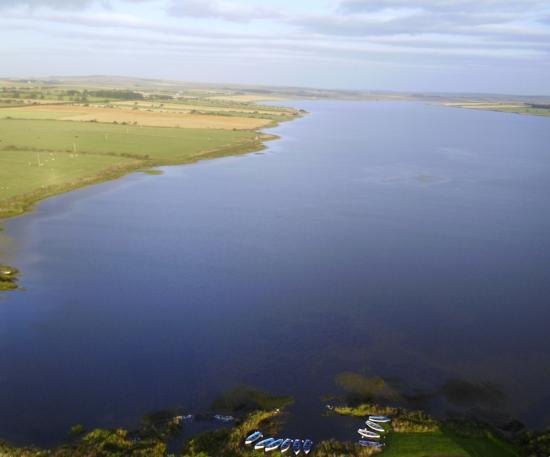Blue-green Algae Warning At Loch Watten, Caithness
29th July 2024

The Highland Council's Environmental Health team is advising caution as blue-green algae has been found in Loch Watten, Caithness.
During periods of prolonged warm weather, the chance of Blue Green algae (cyanobacteria) affecting water courses, particularly ponds, lochs and canals (as well as rivers), increases significantly.
Sometimes the blue green algae can form blooms, which can release toxins into the water.
Samples taken at Loch Watten have indicated the presence of blue-green algae.
Contact with blue-green algae can have health effects for humans and animals; the situation is being investigated by Highland Council Environmental Health Department in partnership with NHS Highland Public Health Department and wider colleagues. As a precautionary measure contact with the algal scum should be avoided by people and pets. Notices will be posted next to the loch warning that contact with the algal scum should be avoided.
Notes
Blue-green algae exist in fresh waters in Great Britain and throughout the world; they are noticed when their concentrations increase to form "blooms" and when they form scums - looking like blue-green paint – or when they collect on the shore line.
Some blue-green algae may give rise to adverse medical effects – but not always. Effects on people coming into contact with toxic scums include skin rashes, eye irritation, vomiting and diarrhoea, fever and pains in muscles and joints. Toxic algae have caused deaths of livestock and dogs, waterbirds and fish. The actions currently taken are precautionary.
The behaviour of algae is erratic.
The level of its toxicity can fluctuate; it can appear one day, be dispersed by the wind and mixing and re-accumulate at any time.
Related Businesses
Related Articles
Council welcomes Visitor Levy flexibility plan
The Highland Council welcomes moves by the Scottish Government to introduce greater flexibility on how it could design a Visitor Levy Scheme for consultation. The Visitor Levy (Scotland) Act 2024 currently provides local authorities with discretionary powers to implement percentage-based levies following statutory consultation.Highland Council is reaching out for views to shape its next 26/27 budget.
As it looks to set out its forthcoming priorities, the council is seeking involvement from members of the public, including businesses, community groups, parents, and young people. All their opinions are going to be crucial in deciding how Highland Council will take on its budget challenge for 2026-2027.Have your say in Thurso's future £100million investment by attending public consultation events
Thurso is to benefit from £100m investment in education and community facilities and are rolling out the first phase of public consultations on 9 and 10 December 2025. The Highland Council is inviting people that live, work, or study in Thurso, to come along to the public consultation events to have their say; this is an opportunity to help shape the future of Thurso, to gather views and ideas.Finding new owners for empty homes - Scheme launched to help return more empty homes to active use
A new online portal has been launched to bring empty homeowners together with prospective buyers or developers with the aim of facilitating more properties to be used as homes again. Covering the whole of Scotland, this builds on the success of local pilots, referred to as "matchmaker schemes".Consideration for short term let control area in Skye and Raasay
Steps towards introducing a short term let control area have been considered by Highland Council's Isle of Skye and Raasay area committee. On Monday (1 December 2025) the committee heard evidence to justify the grounds for the introduction of a Short Term Let Control Area covering all or part of Skye and Raasay.Workforce North event spotlights Highland economy
EMPLOYERS and educators from across the Highlands have gathered to hear how a new initiative is aiming to transform the region's economy. Workforce North - A Call to Action brought together business leaders and teachers from primary and secondary schools from across the Highland Council area with a wide range of partners geared towards education, learning and skills development at Strathpeffer Pavillion.
Council calls for meaningful engagement from Home Office Over 300 Asylum Seekers Being Sent to Inverness
The Highland Council continues to call for meaningful engagement from the Home Office over its plans to temporarily accommodate up to 300 adult male asylum seekers at Cameron Barracks, Inverness. It follows an email on Monday from Alex Norris MP, Minister for Border Security and Asylum, to Council Leader, Raymond Bremner, which failed to answer questions raised by the Council or address community concerns.SSEN Transmission becomes first signatory to Highland Social Value Charter
SSEN Transmission has become the first company to sign up to the Highland Social Value Charter (HSVC), marking a significant milestone in delivering long-term socio-economic benefits for communities across the Highlands. Investment commitments from the company include funding for roads, new homes, jobs, and work for local contractors in addition to a local and regional fund for communities to apply to.Wick - Aberdeen PSO - Update issued 24/11/2025
The Highland Council continues to work through the procurement process for the provision of the Wick Public Service Obligation for the Highland Council. We have now entered the preferred bidder stage and have entered a standstill period.Highland Council winter road condition and school closure report for 25 November 2025
Maps of the Council's gritting routes by priority and policy are available online at www.highland.gov.uk/gritting (external link) The information provided is a summary of reports from operational staff and is intended to give a general indication of typical conditions in each area at a point in time. It is not intended to imply that any individual route is entirely snow and ice free and drivers must be aware that conditions can change rapidly and make their own assessment of conditions for travelling.
